Spotlight (188 found)
World Report 2013: Burma
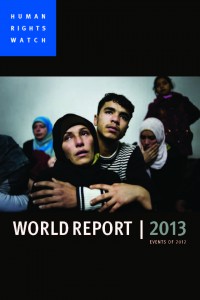 Burma’s human rights situation remained poor in 2012 despite noteworthy actions by the government toward political reform. In April, opposition leader Aung San Suu Kyi and her National League for Democracy party won 43 of 44 seats it contested in a parliamentary by-election; the parliament consists of 224 seats in the upper house and 440 in the lower house, the majority of which remain under the control of military representatives or former military officers
Burma’s human rights situation remained poor in 2012 despite noteworthy actions by the government toward political reform. In April, opposition leader Aung San Suu Kyi and her National League for Democracy party won 43 of 44 seats it contested in a parliamentary by-election; the parliament consists of 224 seats in the upper house and 440 in the lower house, the majority of which remain under the control of military representatives or former military officers
President Thein Sein welcomed back exiles during the year, and released nearly 400 political prisoners in five general prisoner amnesties, although several hundred are believed to remain in prison. Freed political prisoners face persecution, including restrictions on travel and education, and lack adequate psychosocial support. Activists who peacefully demonstrated in Rangoon in September have been charged […]
Deciphering Myanmar’s Peace Process: A Reference Guide
The new nominally civilian government is making serious efforts to achieve peace in Myanmar after more than 60 years of civil war. Peace is critical for ending human suffering and achieving stability; a precondition for overcoming poverty, ensuring long term development and protecting
• • •Chance for Change: Ending the Recruitment and Use of Child Soldiers in Myanmar
This report shows that despite nearly a decade of international engagement and the June 2012 signing of a Joint Action Plan to end the recruitment and use of children between the Myanmar government and the UN, children continue to be recruited and used as soldiers by the Tatmadaw Kyi […]
• • •Freedom in the World 2013: Burma
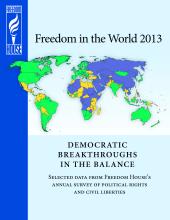 In April 2012, opposition leader Aung San Suu Kyi and her National League for Democracy (NLD) swept parliamentary by-elections, having boycotted the main elections in 2010. The NLD’s inclusion in the political process was accompanied by the continued liberalization of the media, internet, and economy, and by the sporadic release of political prisoners. Burma’s relations with foreign democracies also improved during the year, with several significant visits by international leaders. Despite this progress, ethnic and sectarian violence flared in parts of the country, and armed conflicts between the government and some of the country’s ethnic minority militias remained unresolved […]
In April 2012, opposition leader Aung San Suu Kyi and her National League for Democracy (NLD) swept parliamentary by-elections, having boycotted the main elections in 2010. The NLD’s inclusion in the political process was accompanied by the continued liberalization of the media, internet, and economy, and by the sporadic release of political prisoners. Burma’s relations with foreign democracies also improved during the year, with several significant visits by international leaders. Despite this progress, ethnic and sectarian violence flared in parts of the country, and armed conflicts between the government and some of the country’s ethnic minority militias remained unresolved […]
Burmese Media Spring
This report examines the state of the changes carried out by the government and offers detailed recommendations designed to improve respect for freedom of information in Burma and ensure that the improvements are lasting […]
• • •Cyclone Giri: Two Years On
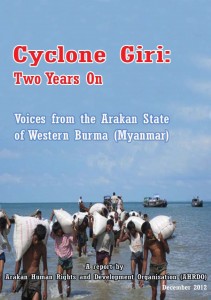 This report, published on the second anniversary of the cyclone, documents and highlights the situation in Arakan State before, during and after Cyclone Giri […]
This report, published on the second anniversary of the cyclone, documents and highlights the situation in Arakan State before, during and after Cyclone Giri […]
The Rule of Law in Myanmar: Challenges and Prospects
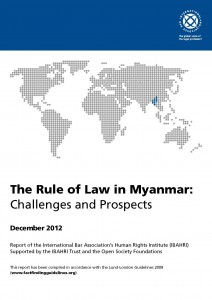 Myanmar is on the cusp of major reforms, but it needs to confront and overcome the legacy of its recent past if those reforms are to make progress. In order to understand Myanmar’s prospects and needs at this important juncture and, more specifically, to find out how far it has begun to adhere to globally prevalent understandings of the rule of law, the International Bar Association’s Human Rights Institute (IBAHRI) sent a delegation to the country’s major cities on a fact-finding mission between 11 and 18 August 2012. Its assessment and conclusions are laid out in this report […]
Myanmar is on the cusp of major reforms, but it needs to confront and overcome the legacy of its recent past if those reforms are to make progress. In order to understand Myanmar’s prospects and needs at this important juncture and, more specifically, to find out how far it has begun to adhere to globally prevalent understandings of the rule of law, the International Bar Association’s Human Rights Institute (IBAHRI) sent a delegation to the country’s major cities on a fact-finding mission between 11 and 18 August 2012. Its assessment and conclusions are laid out in this report […]
Danger Zone: Giant Chinese Industrial Zone Threatens Burma’s Arakan Coast
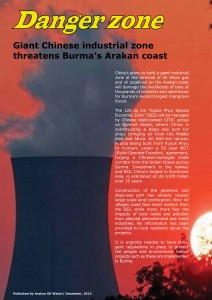 China’s plans to build a giant industrial zone at the terminal of its Shwe gas and oil pipelines on the Arakan coast will damage the livelihoods of tens of thousands of islanders and spell doom for Burma’s second largest mangrove forest. The 120 sq km “Kyauk Phyu Special Economic Zone” (SEZ) will be managed by Chinese state-owned CITIC group on Ramree island, where China is constructing a deep sea port for ships bringing oil from the Middle East and Africa […]
China’s plans to build a giant industrial zone at the terminal of its Shwe gas and oil pipelines on the Arakan coast will damage the livelihoods of tens of thousands of islanders and spell doom for Burma’s second largest mangrove forest. The 120 sq km “Kyauk Phyu Special Economic Zone” (SEZ) will be managed by Chinese state-owned CITIC group on Ramree island, where China is constructing a deep sea port for ships bringing oil from the Middle East and Africa […]
Position on the Repatriation of Refugees from Burma
After the Karenni Refugee Committee (KnRC) organized three workshops on September 20-21st, November 9th and October 8-10th, attended by representatives of KnRC, Karenni community based organizations and religious leaders, the groups agreed on a common position paper on refugees’ repatriation as follow […]
• • •Excluded: Burma’s Ethnic Nationalities on the Margins of Development and Democracy
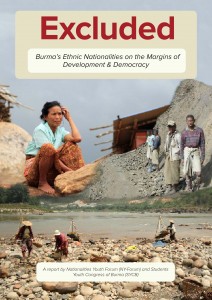 This report presents documented evidence that ethnic nationalities directly affected by development projects in Burma are systematically denied their right to free, prior, and informed consent (FPIC). While development related abuse has been well documented, no report has shed light on the staggering scale of the widespread denial of participation rights in Burma […]
This report presents documented evidence that ethnic nationalities directly affected by development projects in Burma are systematically denied their right to free, prior, and informed consent (FPIC). While development related abuse has been well documented, no report has shed light on the staggering scale of the widespread denial of participation rights in Burma […]









 All posts
All posts